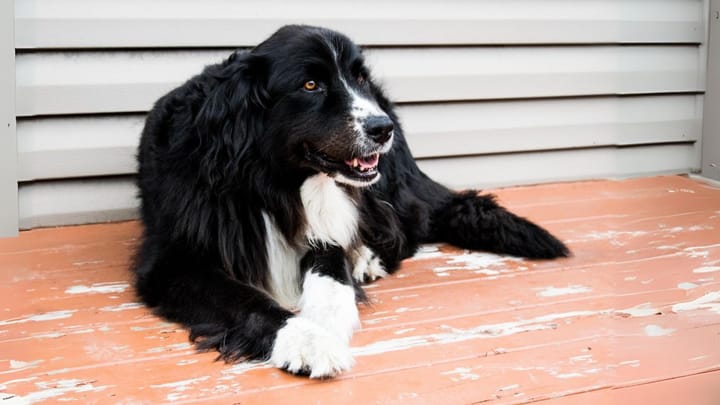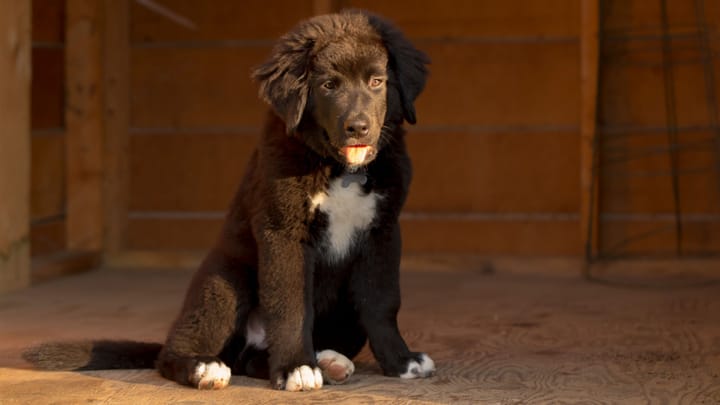Labernese
Crossbreed: Labrador × Bernese Mountain Dog


The Labernese, also known as the St-Pierre, is a designer dog breed developed in Quebec by the Mira Foundation. This cross between a Labrador Retriever and a Bernese Mountain Dog combines the exceptional qualities of two wonderful breeds.
The crossbreed may be fairly new, but it has enjoyed growing popularity in recent years, thanks to its affectionate, intelligent nature. Medium to large in size, the Labernese is well-suited to many different lifestyles. As with any crossbreed, the characteristics of the Labernese can vary from one individual to another.
The Labrador Retriever is one of the most popular breeds in the world, mainly due to its remarkable friendliness, enthusiasm towards all challenges, and its very playful and cheerful personality. Docile, gentle and intelligent, Labradors are used as service dogs, search and rescue dogs, hunting dogs, and of course, as loving pets! They can adapt to all kinds of lifestyles and excel in various canine disciplines.
The Bernese Mountain Dog, of Swiss origin, is a large dog with a spectacular appearance. As gentle as he is powerful, he is a teddy-bear dog that will delight the young and old in everyday life. This is a good guard dog who is very suited for a rural way of life, with moderate exercise needs which must be met daily.

Labrador
The Labrador Retriever is one of the most popular breeds in the world, mainly due to its remarkable friendliness, enthusiasm towards all challenges, and its very playful and cheerful personality. Docile, gentle and intelligent, Labradors are used as service dogs, search and rescue dogs, hunting dogs, and of course, as loving pets! They can adapt to all kinds of lifestyles and excel in various canine disciplines.

Bernese Mountain Dog
The Bernese Mountain Dog, of Swiss origin, is a large dog with a spectacular appearance. As gentle as he is powerful, he is a teddy-bear dog that will delight the young and old in everyday life. This is a good guard dog who is very suited for a rural way of life, with moderate exercise needs which must be met daily.
|
Life expectancy |
The Labernese has a life expectancy of between 10 and 13 years |
|
Temperament |
|
|
Size |
Medium
|
|
Adult size |
Female
Between 24 and 27 in
Male
Between 24 and 28 in
|
|
Adult weight |
Female
Between 62 and 99 lb
Male
Between 71 and 110 lb
|
|
Coat colour
|
Black White |
|
Type of coat
|
Long |
|
Eye colour
|
Brown
|
|
Purchase price |
The Labernese costs between £1500 and £2500 |
F1, F2, F3 generations are terms used to describe different generations of crossbred dogs. Here's how this would apply to a Labernese:
F1 (First Generation) : An F1 Labernese is the direct result of crossing a purebred Labrador Retriever with a purebred Bernese Mountain Dog. The puppies resulting from this cross are first generation hybrids. They have a random mix of traits from both parents, both physically and behaviourally.
F2 (Second Generation) : An F2 Labernese is the result of crossing two F1 Labernese with each other. The puppies from this cross are second generation hybrids. Traits may vary more widely, while other characteristics may begin to stabilise. F2 generation Labernese dogs are often called a St. Pierre.
F3 (Third Generation) : An F3 Labernese comes from crossing two F2 Labernese. Physical and behavioural characteristics begin to stabilise more with an F3 generation, but some variation will still exist.
F4, F5, etc. (Subsequent generations) : From the F4 generation beyond, crosses between previous generation Labernese (e.g., F3 x F3) continue to stabilise traits, which could gradually lead to a more consistent breed standard.
More details about the Labernese
Labernese: Origins and history
The Labernese is a relatively new crossbreed, created in Canada in the 2000s by Éric Saint-Pierre, the founder of the Mira association, which specialisees in training assistance dogs. This cross between the Labrador Retriever and the Bernese Mountain Dog was designed to combine the best qualities of two popular breeds, both known for their intelligence, affection and ability to serve as a guide dog.
The main goal was to create a healthy, longer-lived crossbreed, while retaining the personality traits that Labradors and Burnese Mountain Dogs are famous for. The first crosses took place in the early 2000s, and since then, the Labernese has gained popularity in Quebec and beyond. Although not yet officially recognized as a breed by international organizations, the Mira Foundation continues to work towards stabilising the lineage in order to gain official recognition. The Labernese is now bred by several breeders, excelling as both a family companion and a guide dog.
Labernese: Characteristics
Labernese: Behaviour
Training a Labernese
Due to their intelligence and eagerness to please, Labernese are typically very easy to train. This crossbreed is obedient and responsive to commands. They respond best to positive reinforcement methods.
Labernese: Lifestyle
Breed compatibility Labernese
Labernese: Purchase price
The cost of a Labernese will depend on the breeder and location of the litter. In addition to the initial cost, you will need to factor in monthly expenses for any vet care, pet insurance, a high quality diet, toys and accessories.
Labernese: Shedding
Heavy !
The Labernese sheds heavily. These dogs have dense, medium-length coats that require weekly brushing to prevent matting and remove dead hair. In the spring and autumn shedding may increase, requiring more frequent brushing to maintain coat health and reduce the amount of moulting at home.
Labernese: Health
The Labernese is fairly hardy. While they may be prone to certain health problems, these dogs are typically healthier than their parent breeds.
With their dense coats, the Labernese can have difficulty tolerating high temperatures. In hot weather it's important to offer plenty of shade and fresh water.
The Labernese tolerates cold climates well. It is particularly suited to environments with harsh winters, enjoying long walks even in cold weather.
The Labernese can be prone to weight gain without a balanced diet and enough exercise.
The Labernese can be prone to certain health issues, which may be inherited from either of the parent breeds. These include hip and elbow dysplasia, eye problems and heart conditions . The Bernese Mountain Dog can be prone to cancer, so regular check-ups with your veterinarian are recommended.






